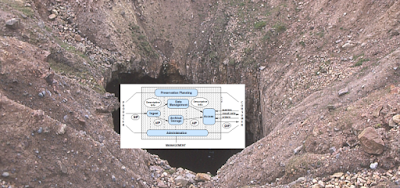SIPs and DIPs, checksums and disk images—in short, all the fun things we talk about in our listservs, blogs, and conferences were probably going to be meaningless to these folks. Instead, I needed to capture what we do on a daily basis and explain why it matters to a fairly diverse group who wouldn't know the OAIS reference model from a hole in the ground.
 |
| Have you seen my functional entities? |
What they really need to know is what we do (at a high level) and why it's important. If we're unable to accomplish this objective—and I would argue that every successful digital archives/preservation program does so—then we face an uphill battle for resources and, ultimately, relevance. And that may only be a wee bit hyperbolic. Advocacy is an integral component of the archival enterprise and we—archives of every size and stripe—are together in this quest to demonstrate our value and seek support.
What is it that you do, anyway?
As archivists, we already face an uphill battle when it comes to explaining our jobs. Throw in the complexities of digital archives and there's little wonder that your spouse/parent/friend's eyes may start to glaze over when you describe an average day on the job. (Or maybe that's only happened to me?) One of our major challenges, then, is to be able to represent our work in a way that others can relate to and understand.
At the same time, advocacy isn't just about education; simply raising awareness about archives and our value is a function of outreach. Advocacy, on the other hand, goes the extra step in seeking to influence the actions and decisions of our interlocutors.
Making the Case
As with any communication, it's important to tailor the message for the audience and the specific issue at hand. The message you deliver to donors of materials may therefore be very different from what you prepare for administrators.
So let's say you've identified the stakeholder(s) you want to reach; while it's important to convey a sense of what you do, save the workflow matrices, code snippets, and UML diagrams for your colleagues. Successful advocacy should involve and inspire the audience so that they understand how and why they might benefit from our work.
This in turn requires us to communicate the "added value" that archivists bring to the preservation and curation of digital archives. This value includes such things as (and I'm preaching to the choir, here):
- Organizing and describing materials so that researchers understand the nature of our collections
- Taking steps to ensure that content can still be accessed and used far into the foreseeable future
- Protecting sensitive personal information and deploying appropriate restrictions based on rights, institutional policies, legal requirements, and donor agreements.
- Improving the means by which people search for and retrieve content
- Developing or providing resources to help researchers use (or reuse) materials in important and meaningful ways.
To help convince the stakeholders of your case, it's also important to highlight any innovations, achievements, or recognition related to the topic at hand. Doing so will establish your/your institution's legitimacy and credentials and points the way to continued or future success. I don't have any hard data to back this up, but it's my strong conviction that current and/or potential stakeholders are more willing to donate their support and/or resources when presented with a proven track record and the opportunity to continue/advance that work. Modesty is no longer a virtue!
And now I'll take the plunge and some of that document I mentioned above:
Over the past two decades, our collective historical record has undergone a sea change: the web has revolutionized publishing and any number of businesses, email and tweets have replaced personal letters, word processing files and spreadsheets now comprise organizational records, and the convenience and ubiquity of smart phones enable us all to amass large collections of digital photographs and video.
As our professional and personal lives increasingly move online and into other digital spaces, the Bentley Historical Library has emerged as a proven leader in the quest to preserve and make accessible essential born-digital materials.
Today, researchers can access the electronic records of former Governor Jennifer Granholm, review the source code for the influential Michigan Terminal System time-sharing operating system from 1968, and study the creative digital output of noted artists such as Peter Sparling, Vince Castagnacci, and Arnold Weinstein.
Our work in “digital curation” encompasses traditional archival functions—the process of selecting materials of high research or intrinsic value and making them accessible to researchers—but also involves additional steps to ensure the integrity and authenticity of content. The Bentley furthermore seeks to add value to materials through the production of detailed description, access portals, and tools that help patrons find answers to their most pressing research questions.
OK—having said all that, I want to acknowledge that I am far from being an expert on this topic! I would be delighted to hear about important points that I've missed or to see examples of successful advocacy for digital archives. If you've got anything to share, leave a comment!

This is a very helpful post. You have lots of good ideas. This is where I share my thoughts: http://preservationmatters.blogspot.com/
ReplyDelete